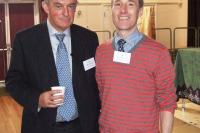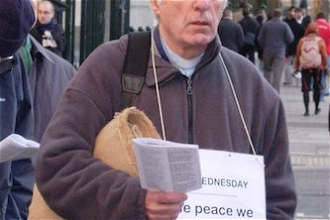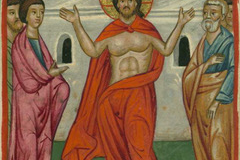Oliver McTernan speaks at media council launch
Former Catholic parish priest, Oliver McTernan, broadcaster, author and Fellow of Harvard University's Centre for International Affairs, delivered the Keynote Address at the launch of the Churches' Media Council yesterday. More than 100 guests attended the the event which was held at Methodist Church House, Marylebone Road, London. They were welcomed by Rev David Deeks, the new Secretary General of The Methodist Church in Britain. Scottish broadcaster Rev Alan Sorensen, led a short service.
Speaking on 'Churches Using the Media' McTernan said: "This evening is a tribute to the vision, wisdom, professionalism and dedication of a number of Christian broadcasters but in particular to Agnellus Andrew and Stuart Cross who in the late sixties recognised the opportunity and challenge that the introduction of local radio presented to the Christian Churches. These two dedicated Churchmen and highly experienced broadcasters firmly believed that Christians had a responsibility to utilise to the full the opportunities offered by the new developments in broadcasting to communicate the truth of the Christian message. They also recognised that to do this efficiently and effectively Christians needed to be more professional in their approach and to learn to work together.
"To pioneer an ecumenical approach in the mid-sixties required a depth of personal courage, faith and commitment that thankfully few today can appreciate. This fact in itself is an acknowledgement of the enormous contribution that CACLB in particular and religious broadcasting in general has and is making to the promotion of ecumenism. Over the thirty years that I have been involved in broadcasting I have always been inspired, encouraged and challenged by the feedback that I have received from listeners, representing a diversity of Christian belief and opinion.
"The fact that the successor organisation of CACLB, the Church's Media Council, is being launched today as an official agency of Churches Together in Great Britain and Ireland and of Churches Together in England is a clear indication of the progress that has been made and that the Churches have come to recognise, at least officially, the need to be more professional in our approach to the media.
"Religion is assuming a new role for itself in global political and economic affairs and is in the words of one social scientist beginning to re-emerge as a dynamic force with the capacity to surprise. The prevailing mindset that dominates Western social and political thought remains profoundly securalist, looking on religion as an epiphenomenon, a mask for something other than what it appears to be. Where religion is a significant factor, secularists tend to dismiss it as nothing more than a front for political power, grievance or greed. Until there is a shift in this mindset and it is recognised that religion can in itself be a major contributing factor in promoting violence, political leaders will continue to underestimate the extent of the threat that religiously motivated conflict and terrorism poses.
"Northern Ireland, the Middle East, Sri Lanka are good examples of conflicts where the official efforts at peace making have ignored the religious differences with disastrous consequences. My own research shows that a key factor in the formation of the religious mindset that fosters terrorism is the attitude towards revelation when sacred texts are interpreted in a way to bolster claims of exclusivity or spiritual superiority; the risk of prejudice and high boundaries that allow for active discrimination and even worse, is very real.
"As Christian broadcasters we have an enormous responsibility. We need to recognise and to address this challenge in a way that can help to promote a more honest and objective debate that will help the political world to analyse more accurately the true nature of the crisis we face. It is only when the analysis is right that the response is likely to be more effective. The current secularist analysis that fails to comprehend either the creative or destructive potential of the different religious traditions has led the majority of Western political leaders and commentators into the misguided belief that religiously inspired terrorism can be dealt with either by the bullet or the ballot box.
"Broadcasters must help religious leaders to understand that it is not enough for them to denounce the murderous actions of their co-religionists and to disown them as misguided fringe groups. We must be ready to uphold the right of different faith traditions to have the level of access to the media that we ourselves enjoy. To actively promote the right of others to share their own message in this way may well present us with the kind of adaptive challenge that requires us to re-examine some of our own firmly held beliefs and loyalties. To act in this way is not to promote indifferentism or relativism. On the contrary, I believe it is to uphold in practice the most fundamental Christian belief that life is a sacred gift that should be respected and cherished in all circumstances. Error may not have rights but the human person whom I may judge to be in error has the right to express his or her beliefs. No faith tradition should be tempted to claim that we possess exclusively the fullness of divine truth. We need the challenge of diversity to discover the richness of our own tradition.
"My own commitment to inter-faith broadcasting is rooted in the personal experience of working closely with my friend and colleague, the late Rabbi Hugo Gryn when we were both on Capital Radio's Advisory Board. On one particular occasion we were both subjected to a haranguing by a Christian colleague as we supported the proposal that the Muslim community should be included in the rota of presenters. The vehemence of his argument so traumatized Hugo that he asked me on our way home to sit with him in silence at the end of which time he simply said to me 'I've seen those eyes before'. Those who are familiar with Hugo's story will realize that he was referring to the eyes of intolerance that he had encountered in the death camps. Our commitment to pluralism on air should not distract from our commitment to express unambiguously and uncompromisingly the truth as we believe it.
"Lastly, let me say that our engagement with the media should be a two-way dialogue. If we want to use the media to communicate our message we should also be open to how that same media perceives us. There is always the temptation for any institution or group to want to use the media to present a positive image. We must never forget that the glare of publicity can attract the attention that highlights our failings as well as our achievements. This was the message that the Boston Roman Catholic Archdiocese had to learn in a most painful and unnecessarily destructive way."
Bishop Tom Butler, Anglican Bishop of Southwark and Chairman of the Council said: "Our mission is to develop, encourage and promote Christian involvement in all aspects of the media in the UK and Ireland. God's values and His personality are communicated to us in His Son's life and in His continued living. What we have received compels us to communicate this to others. We must communicate the Love of God and the Salvation message to His people, using all available means.
"Christ - and John Wesley - were the great communicators of their times, using the most powerful and effective means of their times. We must do the same; and in today's day and age that means using the media, in all its various shapes and forms. The Churches' Media Council is committed to lead that effort and I commend its formation to you as a valuable step forward in bringing our message - His message - to meet the people where they are and enable them if they wish to connect with the Almighty."
Archived story: 11 September 2003




















